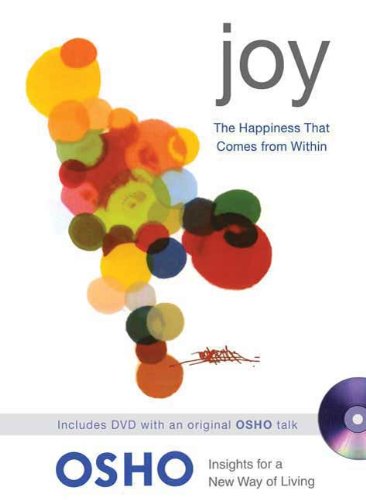The Insight for a New Way of Living series aims to shine light on beliefs and attitudes that prevent individuals from being their true selves. The text is an artful mix of compassion and humor, and readers are encouraged to confront what they would most like to avoid, which in turns provides the key to true insight and power.
Joy is a wondrous investigation into the source and importance of joyfulness in our lives.
The Insight for a New Way of Living series aims to shine light on beliefs and attitudes that prevent individuals from being their true selves. The text is an artful mix of compassion and humor, and readers are encouraged to confront what they would most like to avoid, which in turns provides the key to true insight and power.
Joy is a wondrous investigation into the source and importance of joyfulness in our lives.

Best book on Happiness/Joy I’ve ever read This is the first Osho book I read. Before this I had avoided his books entirely, because the media had widely publicised that this Guru had 93 Rolls-Royces in his collection and portrayed him as nothing more than a charlatan in disguise. But a close friend had praised the insights gained from his books and I felt that I had to give his teachings a fair hearing.As a Guru, he was far from being a cave-dweller; instead this former Professor of Philosophy (University of Jabalpur,1958-66) was more of a modern rebel, and this may understandably disappoint some folks on their expectations of what a Guru should be. But his answer on the 93 Rolls-Royces and other fineries he had, was that he simply used what was available. He was a practical man indeed!In reading this book, I was amazed to find page after page of ‘bang on-target’ penetrating insights, peppered with sharp observations of human nature and ocassionally punctuated with entertaining parables told with wry humour. Read this book if you want to know the difference between pleasure, happiness, joy and bliss.Some brief excerpts from the book:-’..asking for more is what our mind is – a constant asking for more. It makes no difference how much you have, the mind will go on asking for more.”..mind is a daydreaming faculty. Unless you go beyond the mind, you will continue to daydream. The mind cannot exist in the present. To be in the present is to be without mind.”..mind is a mechanism to create unhappiness. If you drop the mind, suddenly you become happy – for no reason at all.”..madmen and mystics have something similar..both are out of the mind. The madman has fallen below it, the mystic has gone beyond it.”..unless you start living in the present, you will not be able to forget and forgive the past. Awareness cannot be in the past and cannot be in the future. Awareness knows only the present.”..as you feel the bliss of being in the present, you will stop doing this stupid thing that everybody goes on doing. You will stop going into the past. You will not have to forget and forgive, it will simply disappear of its own accord.’This book is filled with similar gems of wisdom and I strongly recommend this book if you wish to comprehend the elusive nature of happiness/joy. Notwithstanding that he was a controversial Guru when he was alive (1931-1990), the contents of this book will still take your understanding way beyond what the current crop of pop psychology books can offer on this subject.And then, when you are ready for the next level of mental/spiritual evolution, these 2 books are must-haves:-’Talks With Ramana Maharshi’ by Robert Powell (ISBN: 1878019007)’I Am That’ by Nisargadatta Maharaj (ISBN: 0893860220)
Osho does it again In “Joy–The Happiness that Comes From Within” Osho proves himself once again to fit squarely in the tradition of cultural physicians past and present (Nietzsche, Colin Wilson, Erich Fromm, Laing) and clearly states that society as it exists is little more than a mass neurosis of fear, culturally glorified narcissism, and above all, fear of openness. Perhaps the only problem with his work is that it is being marketed in a culture directly inimical to it’s message–as a Westerner, I have trouble inculcating his on-the-mark attacks simply because I am a Westerner. Osho has written the same book countless times, and his message never becomes less relevant for the repetition. He is a poet, philosopher and sage all at the same time, and his constant exhortation to ‘drop the ego’ could be characterized as the central message in his work. The only thing I take issue with in his work is his persistent dismissal of culture’s irrevocable (and sometimes irreversible) influence on the individual. If one could simply ‘drop out’ of this mass neurosis a lot more intelligent people would have done it by now. Nonetheless, his work is invaluable and I am certain that one day Osho’s name will be up there with the greats of both literature, eastern thought and creativity.
something the therapists can’t offer He gives wisdom (not advice) to questions like “is this all there is? life seems meaningless” and “why do i feel so much pain in letting go of the things that are causing me misery?”well! osho is the first to give me a peace of mind on these matters. if you just don’t see the point to anything, maybe this book is for you.